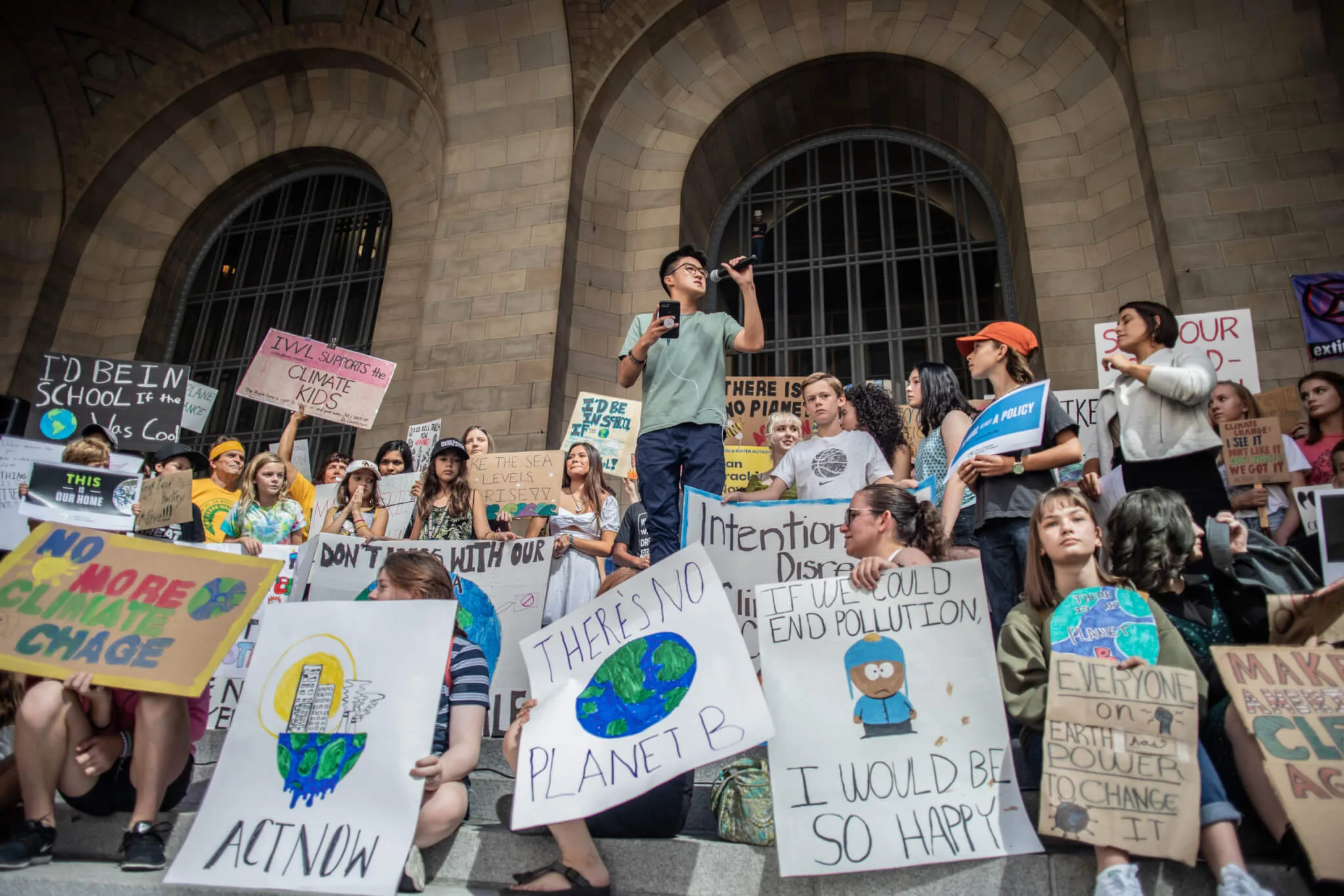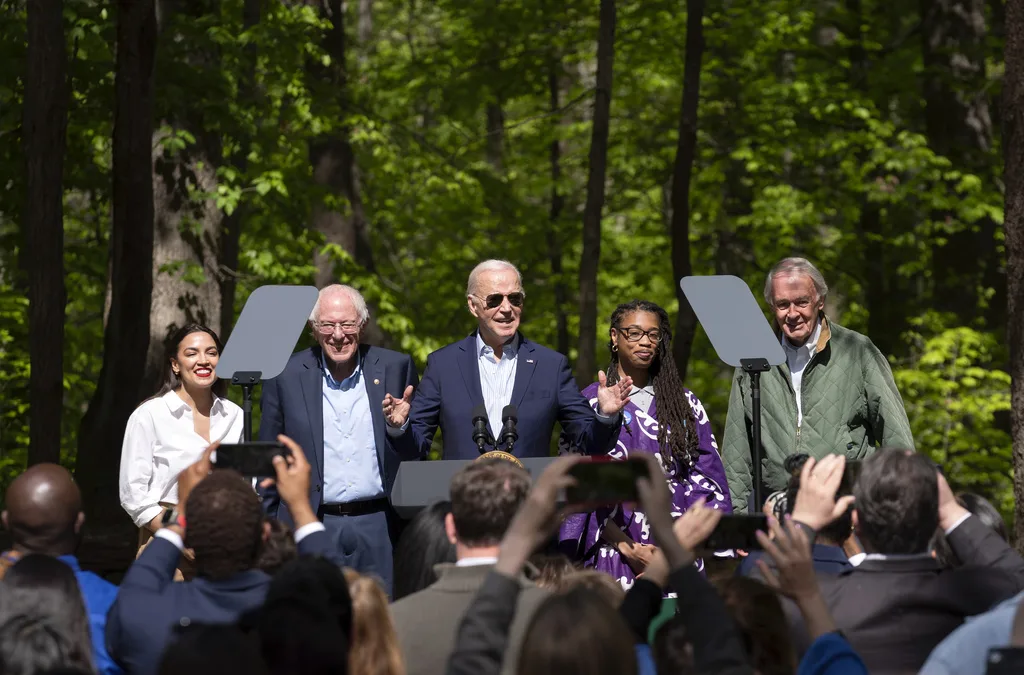
Rally in Pittsburgh, July 2019. Image via Shutterstock
Polls show an overwhelming majority of voters in the state believe climate change is a serious problem that needs to be addressed.
With the general election less than two months away, it’s crucial to know where the candidates stand on issues, such as climate change, that affect everyone in Pennsylvania.
Polls show an overwhelming majority of voters in the state believe climate change is a serious problem that needs to be addressed.
Because the state’s economy is so closely tied to the fossil fuel and petrochemical industry, Pennsylvania is the fourth largest producer of greenhouse gas emissions in the country, according to the U.S. Energy Information Administration. Scientists attribute climate change largely to greenhouse gas emissions.
While Pennsylvanians might be concerned about the effects of climate change—which have triggered everything from warmer winters to record flooding in recent years—not much has been done in Harrisburg to combat this problem.
Democrats generally support switching Pennsylvania to clean, renewable energy sources while Republicans generally support keeping the state reliant on fossil fuel-based energy. The latter believe that switching will cause an economic collapse, while Democrats see ways to support adding new jobs to the economy.
To find out where the candidates vying for a seat or another term in the state Senate stand on climate change, The Keystone reached out for a statement on what they plan to do to address the climate crisis. Where possible, we’ve included the candidate’s direct responses, information from their campaign websites, voting history, and social media postings.
When applicable, we’ve also included scores from the Pennsylvania Environmental Scorecard, which are tallied using an analysis of lawmakers’ voting record on a number of environment-related bills.
District 9 (Parts of Chester and Delaware Counties)
Sen. Thomas Killion, Republican Incumbent: Killion has recently cleaned up his environmental act. In 2015 and 2016, the lawmaker only received a 40% on the Pennsylvania Environmental Scorecard. However, by 2017 and 2018, he voted pro-environment on six different bills and earned a 100% on the scorecard.
This summer, however, Killion joined his fellow Republicans to support House Bill 732, which gave a $670-million tax break to the natural gas industry. Environmental advocates questioned the wisdom of giving away taxpayer dollars to a declining industry amid a global health pandemic and the worst economic collapse in nearly a century.
John Kane, Democratic Challenger: According to Kane’s campaign website, he believes that “we are on a dangerous course to permanently damage our planet for our future generations. Global inaction, and inaction here in Pennsylvania, will be the defining feature of my generation moving forward.” If elected, he promises to keep large corporations accountable to prevent further damage.
District 11 (Part of Berks County)
Sen. Judy Schwank, Democratic Incumbent: Schwank is currently the Dean of Agriculture and Environmental Sciences at Delaware Valley College. She holds a 91% lifetime score on her Environmental Scorecard, but just 75% for 2020. Schwank has a history of voting for environmental protections. She did not respond to a request for comment.
Annette Baker, Republican Challenger: Baker promises on her campaign website that she will “encourage the responsible use of our natural resources for economic development” while also “balancing the need for protection.” She did not respond to a request for comment.
District 13 (Part of Lancaster County)
Sen. Scott Martin, Republican Incumbent: Martin has voted against the environment on every issue recently, including supporting HB 732, which established a petrochemical tax credit. He also came out against pro-environment amendments for the bill, including requiring environmental studies and a greenhouse gas emissions plan. He currently holds a lifetime score of 0% on the Environmental Scorecard.
Janet Diaz, Democratic Challenger: Diaz states on her campaign website that environmental issues are one of her primary concerns if she gets elected. She believes that “global climate change is the most serious environmental challenge facing Pennsylvania.” She also states she will help set Pennsylvania on a “path to 100% clean energy.”
District 15 (Parts of Dauphin and Perry Counties)
Sen. John DiSanto, Republican Incumbent: DiSanto’s voting record and Environmental Scorecard score of 0% reflect a lack of concern for climate change. He has consistently voted against measures to protect the environment and for measures like HB 732, which subsidizes the fracking industry by giving tax breaks to certain companies. He did not respond to a request for comment.
George Scott, Democratic Challenger: Scott has called the climate crisis “the single greatest long-term threat to our globe.”
Per an email sent by his campaign: “Many elected officials have claimed that we must choose between our economy and our environment. This is a false choice,” Scott said. “We can grow our economy and protect our environment, but we need the right policies—and the right leaders to implement them … I will fight for robust workforce redevelopment and job training efforts to ensure a just transition for anyone who is displaced as Pennsylvania’s energy sector continues to evolve.”
District 17 (Parts of Delaware and Montgomery Counties)
Amanda Cappelletti, Democratic Candidate: Cappelletti plans to take climate change seriously, according to her campaign site. “Amanda will fight, every day, to protect and preserve our environment, combat climate change, and ensure that generations from now can enjoy the great outdoors of Pennsylvania … As a Senator, Amanda will work to protect the environment and our future – not the interests of the fossil fuel lobby.” She did not respond to The Keystone’s request for comment.
Eileen Fisher, Republican Candidate: Fisher’s campaign website does not mention anything about climate change and how it affects Pennsylvanians. She did not provide a comment on climate change when asked.
District 19 (Part of Chester County)
Carolyn Comitta, Democratic Candidate: Comitta, who currently represents the 156th District in the PA House, was endorsed by the Conservation Voters of PA for the Senate. In August, she announced she would be the co-prime sponsor of House Bill 2797, a bipartisan bill that aims to maintain the Joint Legislative Air and Water Pollution Control and Conservation Committee, which, among other things, studies and recommends changes to air and water pollution laws.
Kevin Runey, Republican Candidate: Climate change and environmental protections are not issues that appear on Runey’s campaign website or his Facebook campaign page. Runey did not respond to an inquiry about his stance on climate change.

District 21 (Clarion, Forest, Venango, and Parts of Butler and Warren Counties)
Sen. Scott Hutchinson, Republican Incumbent: Hutchison scored a 0% on the Environmental Scorecard for the 2019-2020 legislative session. He did not respond to an email inquiry on climate change.
Shelbie Stromyer, Democratic Challenger: “I am against the four Methane-producing facilities with the large tax credits especially because there was no guarantee of public safety, of employee safety, of environmental safety, of Pennsylvanians actually building the facilities or a decent wage being paid to those working there,” Stromyer told The Keystone. “Rural PA has enough pollutants in our air and water and our water flows directly to the metro areas. I back solar and windmill energy.”
District 23 (Bradford, Lycoming, Sullivan, Union and Parts of Susquehanna Counties)
Sen. Gene Yaw, Republican Incumbent: During a June hearing weighing the merits of a multi-state initiative to limit carbon emissions from power plants, Yaw shared his priorities for the state this way: “The three steps are: You have to have energy, you have to have an economy, and then you can afford to worry about the environment. Frankly, if you’re worried about where your next meal is coming from, you probably don’t care too much about the environment.”
He scored 0% on the Environmental Scorecard for 2019-2020. He did not respond to an email asking for further clarification on where he stands on climate change.
Jackie Baker, Democratic Challenger: Baker’s campaign site expresses an interest in protecting the environment and ensuring Pennsylvanians have access to clean water and air. Her campaign did not respond to a request for comment from The Keystone.
District 25 (Cameron, Clinton, Elk, Jefferson, Mckean, Potter, Tioga, and Parts of Clearfield Counties)
Margie Brown, Democratic Candidate: In an email sent to The Keystone, Brown said: “The world’s scientists say climate change is not only real, but that its impact will continue to increase and cause problems … We must continue to work on scientific solutions to reduce carbon output. Locally, we should be capping abandoned well sites and retrofitting any sites that are currently in use so that they can be managed during disastrous downturns in the industry, such as the one we are now experiencing.”
Cris Dush, Republican Candidate: Dush opposes Gov. Tom Wolf’s proposal to join the Regional Greenhouse Gas Initiative (RGGI) and signed his name to a bill requiring legislative approval before joining a multi-state agreement and strips the Department of Environmental Protection (DEP) of its power to regulate carbon pollution across all sectors. The RGGI’s primary objective is to help reduce the amount of carbon dioxide produced from the power industry. Dush did not respond to a request for comment.
District 27 (Columbia, Montour, Northumberland, Snyder, and Parts of Luzerne Counties)
Sen. John Gordner, Republican Incumbent: Gordner does not list any major connections to helping or preserving the environment or enacting climate change laws on his campaign website. He has a rating of 0% on the most recent Environmental Scorecard. He did not respond to a request for comment on the climate.
Michelle Siegel, Democratic Challenger: Siegel is running a pro-environment platform. When she was a child, her grandparents’ well was poisoned by an unlined coal ash pit, and both her grandfather and uncle developed cancer as a result.
“As a state senator,” Siegel told The Keystone, “I would work to clean up legacy pollution, like ash pits, and prevent future contamination.”
She is also well-versed in climate science, having obtained a degree in earth and environmental sciences with concentrations in groundwater hydrology and climate change from Susquehanna University. “While climate change is a global issue, we are feeling the effects right here in Central Pennsylvania,” she said. “Increased flooding and droughts have a devastating impact on local farmers. I believe we must diversify the energy grid, and so I support a severance tax on natural gas.” She also pledged to push for diversification and help workers transition to clean-energy jobs, and to better regulate the fossil fuel industry.
District 31(Parts of Cumberland and York Counties)
Sen. Mike Regan, Republican Incumbent: In Regan’s first term, he did not take any major stands on environmental or climate change issues. His 2019-2020 Environmental Scorecard is 0%. He did not respond to a request for a comment.
Shanna Danielson, Democratic Challenger: Danielson is running on a platform to combat the climate crisis, according to her campaign website, though she does not list environmental concerns as a key issue. She did not respond to an email asking for comment on climate change.
District 33 (Adams County and Parts of Cumberland, Franklin, and York Counties)
Sen. Doug Mastriano, Republican Incumbent: Mastriano has a lifetime score of 0% on the 2019-2020 Environmental Scorecard. He did not respond to The Keystone’s request for comment.
Richard Sterner, Democratic Challenger: Sterner supports environmental reform and changes, according to his campaign website. He wants to help develop and maintain reliable and renewable clean energy, and also states he is interested in providing retraining programs for people working in the energy industry when switching to clean energy. He did not respond to an email asking for further comment.
District 35 (Bedford, Cambria and Parts of Clearfield County)
Sen. Wayne Langerholc, Republican Incumbent: Langerholc does not discuss climate change on his website or as part of his re-election campaign. He scored a 0% on the 2019-2020 Environmental Scorecard. He did not respond to a request for comment on climate change.
Shaun Dougherty, Democratic Challenger: It is not clear where Dougherty stands on climate change. According to his website, his primary focus is on promoting education, the Second Amendment, and the economy, as well as supporting victims of abuse. He did not respond to a request for comment on climate change.
District 37 (Parts of Allegheny and Washington Counties)
Sen. Pam Iovino, Democratic Incumbent: Iovino has voted against legislation that would redefine “pollution” in the Clean Streams Law and revert regulations for drilling operations to outdated standards. She believes that environmental protection does not need to come at the expense of the economy, and has earned a 75% lifetime rating on the 2019-2020 Environmental Scorecard.
Devlin Robinson, Republican Challenger: Robinson has not indicated that climate is an important issue for him. He has instead championed a corporate tax break and says “now is not the time” to raise Pennsylvania’s minimum wage.
District 39 (Parts of Westmoreland County)
Sen. Kim Ward, Republican Incumbent: Ward does not support the Regional Greenhouse Gas Initiative (RGGI), which would put a tax on emissions of natural gas and coal. She claims many jobs are dependent on the abundant natural resources of the state. She has a 0% score on the 2019-2020 Environmental Scorecard. She did not respond for further comment when asked via email.
Tay Waltenbaugh, Democratic Challenger: Waltenbaugh is a strong supporter of environmental issues, according to his campaign website. He wants to support clean energy and help improve air and water quality throughout Pennsylvania. He supports both current and future energy initiatives and making sure it is as clean as possible. He did not respond to an email asking for a comment on climate change.
District 41 (Armstrong County and Indiana County and parts of Butler County and Westmoreland County)
Sen. Joe Pittman, Republican Incumbent: Pittman opposes Wolf’s plans for enacting clean energy. He believes that Pennsylvania should safely support the continued use of coal and other “God-given” resources to produce energy. His stance has earned him a lifetime rating of 0% on the 2019-2020 Environmental Scorecard. He did not respond to a request for comment.
Tony DeLoreto, Democratic Challenger: It is not clear from DeLoreto’s campaign website where he stands on climate change and issues affecting the environment. He did not respond to a request for comment.
District 45 (Parts of Allegheny and Westmoreland Counties)
Sen. James Brewster, Democratic Incumbent: Although Brewster supported a bill to give a $670-million subsidy to the fossil fuel industry, he did vote in favor of an amendment to that legislation requiring a pre-tax credit environmental impact study. His 2019-2020 Environmental Scorecard rating is 57%.
Nicole Ziccarelli, Republican Challenger: Ziccarelli’s campaign website does not address climate change. She does state, however, that it “is vital to decrease our state’s regulatory burdens that are hindering our economic competitiveness in the industry.” She did not respond to a request for further comment on climate change.
District 47 (Lawrence and Parts of Beaver and Butler Counties)
Sen. Elder Vogel, Republican Incumbent: According to his campaign website, Vogel has supported the reduction of standards on older passenger vehicles emissions requirements for inspections. He scored 0% on the 2019-2020 Environmental Scorecard, but does have a 19% lifetime rating. He did not respond to requests for comments.
Stephen Krizan III, Democratic Challenger: According to Krizan’s campaign website, he supports job creation in the clean energy fields. He also supports switching to green, renewable energies, which includes creating new jobs and stimulating the economy. He did not respond to a request for comment from Keystone.
District 49 (Parts of Erie County)
Daniel Laughlin, Republican Incumbent: According to the Environmental Scorecard, Laughlin voted against the environment on eight bills and received a 0% rating in 2019-2020 with a lifetime score of 7%. He did not respond to a request for comment.
Julie Slomski, Democratic Challenger: Slomski has earned the endorsement of the Conservation Voters of Pennsylvania. As the group writes in its endorsement: “Julie is acutely aware of the environmental issues that frontline communities in her district face. She is committed to introducing legislation to address disparities in environmental justice communities and to ensure that low-income communities have equal access to clean air, land, and water.” She did not respond to an email asking for her stance on climate change.
READ MORE: We Asked Senate Candidates How They Plan to Protect Access to Affordable Health Care
Politics

Influencers and creators find new ways to engage young Philadelphia voters
Rec Philly, a space for creators and influencers, teamed up with Show Up Strong to get hundreds of young Philadelphia residents engaged in the...

New Biden rule protects privacy of women seeking abortions
Under the new rules, state officials and law enforcement cannot obtain medical records related to lawful reproductive health care with the goal of...

Biden marks Earth Day by announcing $7 billion in solar grants
The Biden administration on Monday announced the recipients of its Solar For All Program, a $7 billion climate program that aims to lower energy...
Local News

Conjoined twins from Berks County die at age 62
Conjoined twins Lori and George Schappell, who pursued separate careers, interests and relationships during lives that defied medical expectations,...

Railroad agrees to $600 million settlement for fiery Ohio derailment, residents fear it’s not enough
Norfolk Southern has agreed to pay $600 million in a class-action lawsuit settlement for a fiery train derailment in February 2023 in eastern Ohio,...





